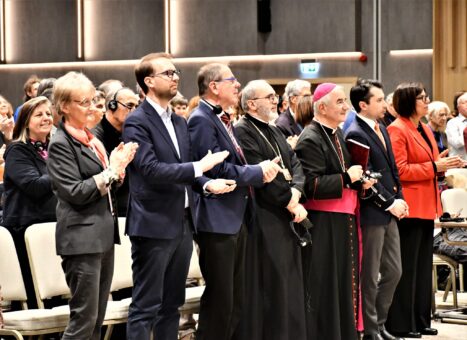
Nov 23, 2023 | Non categorizzato
The city of Timisoara, Romania, recently hosted the annual meeting of Together for Europe (IpE) on the theme “Called to Unity.” This meeting brought together 51 movements representing more than 300 Christian realities and communities within IpE’s vast network. Creating living spaces in the cracks In the complex sociopolitical context that Europe is currently experiencing, leaders of Together for Europe (IpE) gathered from November 16-18, 2023 in Timisoara, Romania, to address an important question, “What is the role of christian communities in Europe today?” This question has gained relevance in the face of global issues such as various ongoing conflicts, migration dynamics, and the climate crisis. 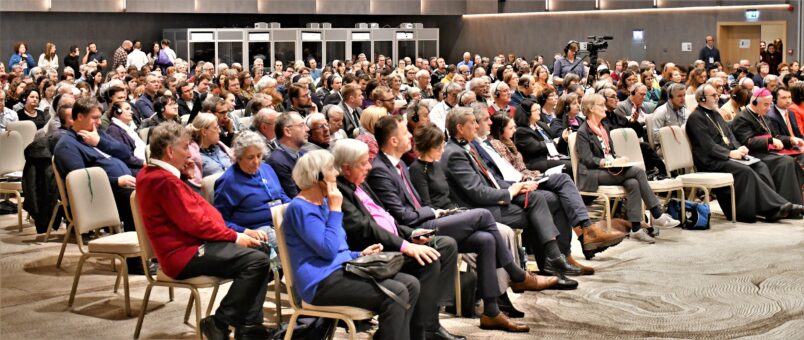 Herbert Lauenroth, historian and member of IpE’s Steering Committee, emphasized the crisis affecting all Churches and highlighted the weight of the moment: “Where is Europe today, Together for Europe? What kind of Europe, what kind of ‘Togetherness’ are we moving toward?” Against a backdrop of growing uncertainty, participants discussed what “Together for Europe” means, trying to discern the direction and future prospects. From the first sessions, it was evident that the choice of Timisoara as the venue for the meeting added an extra layer of significance. The European Capital of Culture 2023 is a testimony to the harmonious coexistence of different christian denominations, where diverse communities meet and thrive in unity. Gerhard Proß, IpE moderator and head of the CVJM (Christlicher Verein junger Menschen) in Esslingen, Germany, offered a perspective from the christian faith: “God creates space in the cracks,” he said, “Jesus himself entered the deepest of cracks in this world.” He went on to explain that the image of Christ, with his arms outstretched between heaven and earth, symbolizes a deep entrance into the cracks between God and humanity, between individuals, groups, denominations and nations. Jesus went down into the deepest: “There he created a space of life.” Words that resonated deeply, provoking reflections on how, in the face of contemporary challenges, Christian communities can create spaces of life in the midst of division, tension and uncertainty. Cultivating unity
Herbert Lauenroth, historian and member of IpE’s Steering Committee, emphasized the crisis affecting all Churches and highlighted the weight of the moment: “Where is Europe today, Together for Europe? What kind of Europe, what kind of ‘Togetherness’ are we moving toward?” Against a backdrop of growing uncertainty, participants discussed what “Together for Europe” means, trying to discern the direction and future prospects. From the first sessions, it was evident that the choice of Timisoara as the venue for the meeting added an extra layer of significance. The European Capital of Culture 2023 is a testimony to the harmonious coexistence of different christian denominations, where diverse communities meet and thrive in unity. Gerhard Proß, IpE moderator and head of the CVJM (Christlicher Verein junger Menschen) in Esslingen, Germany, offered a perspective from the christian faith: “God creates space in the cracks,” he said, “Jesus himself entered the deepest of cracks in this world.” He went on to explain that the image of Christ, with his arms outstretched between heaven and earth, symbolizes a deep entrance into the cracks between God and humanity, between individuals, groups, denominations and nations. Jesus went down into the deepest: “There he created a space of life.” Words that resonated deeply, provoking reflections on how, in the face of contemporary challenges, Christian communities can create spaces of life in the midst of division, tension and uncertainty. Cultivating unity 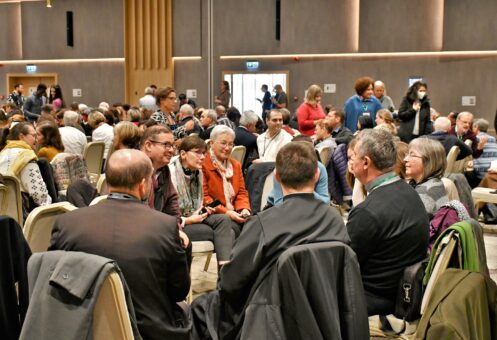 The attendees participated in dialogue sessions, engaged together in intellectual discourse, experiential workshops and prayer times. Six workshops explored topics such as social integration, youth perspectives, ethics and non-violence, promoting a deeper understanding of diversity within the Christian community. One highlight was a visit to the Orthodox Cathedral Museum, followed by Vespers in the city’s Orthodox Cathedral, attended by dignitaries and religious leaders from the different churches present. These
The attendees participated in dialogue sessions, engaged together in intellectual discourse, experiential workshops and prayer times. Six workshops explored topics such as social integration, youth perspectives, ethics and non-violence, promoting a deeper understanding of diversity within the Christian community. One highlight was a visit to the Orthodox Cathedral Museum, followed by Vespers in the city’s Orthodox Cathedral, attended by dignitaries and religious leaders from the different churches present. These 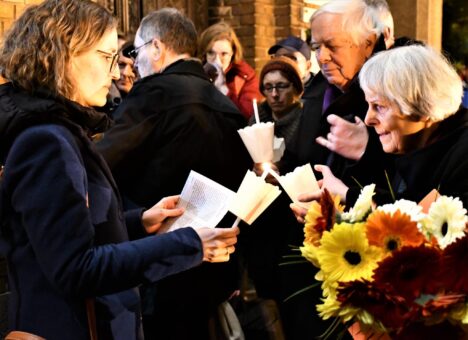 moments of common prayer fostered a harmonious atmosphere in which unity and diversity coexisted. Plenary talks and activities were punctuated by music and prayer, creating a thread throughout the conference. During one of their songs, the Ecumenical Youth Choir invited everyone to embrace different ways of praying, “We know that we all pray in our own way. Let us open ourselves to experience each other’s prayer during these days in Timisoara.” Particularly powerful was the moment of prayer for peace in which conflicts around the world were named, with a focus on Ukraine and the Middle East. All participants pledged their commitment to unity, making a pact of mutual love. A moment that was meant to symbolize the cornerstone on which a fraternal Europe is founded. Linking values to policies
moments of common prayer fostered a harmonious atmosphere in which unity and diversity coexisted. Plenary talks and activities were punctuated by music and prayer, creating a thread throughout the conference. During one of their songs, the Ecumenical Youth Choir invited everyone to embrace different ways of praying, “We know that we all pray in our own way. Let us open ourselves to experience each other’s prayer during these days in Timisoara.” Particularly powerful was the moment of prayer for peace in which conflicts around the world were named, with a focus on Ukraine and the Middle East. All participants pledged their commitment to unity, making a pact of mutual love. A moment that was meant to symbolize the cornerstone on which a fraternal Europe is founded. Linking values to policies 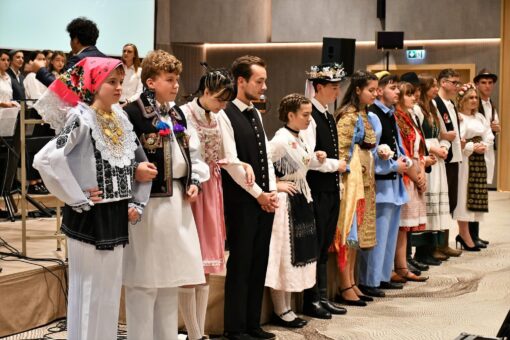 As part of the EU-funded DialogUE project, the annual “Together for Europe” meeting also addressed issues aimed at developing advice and recommendations for EU social policies. Professor Philip McDonagh, a former Irish diplomat and director of Dublin University’s “Center for Religion, Human Values and International Relations,” stressed the importance of Article 17 of the Treaty on the Functioning of the European Union (TFEU). This article promotes open and transparent dialogue on major social issues facing Europe through high-level meetings and seminars for dialogue and work between european institutions and Churches, as well as non-denominational and philosophical organizations. The professor emphasized the contribution of Churches in public debate, drawing on their philosophical foundations, values of compassion, care, solidarity, and respect for pluralism. He hoped that Churches would work to bridge the gap between high-level values and everyday policies, offering a much-needed perspective on issues such as peace, inclusion, and integration. Calling for a multilateral approach, he stressed the need for Europe to be perceived positively by the global community and highlighted the responsibility to consider the perspectives of the Global South. Hope in unity
As part of the EU-funded DialogUE project, the annual “Together for Europe” meeting also addressed issues aimed at developing advice and recommendations for EU social policies. Professor Philip McDonagh, a former Irish diplomat and director of Dublin University’s “Center for Religion, Human Values and International Relations,” stressed the importance of Article 17 of the Treaty on the Functioning of the European Union (TFEU). This article promotes open and transparent dialogue on major social issues facing Europe through high-level meetings and seminars for dialogue and work between european institutions and Churches, as well as non-denominational and philosophical organizations. The professor emphasized the contribution of Churches in public debate, drawing on their philosophical foundations, values of compassion, care, solidarity, and respect for pluralism. He hoped that Churches would work to bridge the gap between high-level values and everyday policies, offering a much-needed perspective on issues such as peace, inclusion, and integration. Calling for a multilateral approach, he stressed the need for Europe to be perceived positively by the global community and highlighted the responsibility to consider the perspectives of the Global South. Hope in unity  Margaret Karram, president of the Focolare Movement, was present along with Co-President Jesús Morán and spoke, offering words of hope: “I would like to have with all of you this conviction: everything is possible!” Her words encouraged an optimistic outlook, the recognition of shared humanity, and the creation of networks of fraternity. Karram encouraged the Together for Europe network to embrace Gospel-born charisms, engage in dialogue and open spaces to pursue tangible responses to contemporary challenges. Bishop Josef-Csaba Pál of Timisoara expressed gratitude for these days: “A small seed of this fraternity, unity, and love has been sown in us, in our Churches, but also in society. The Together for Europe network is one of those wonderful initiatives where God has allowed good things to grow over the years. Let us continue to work together with all people of good will!” Looking ahead, it was announced that the next annual meeting of Together for Europe will be held in Graz-Seckau, Austria, from October 31 to November 2, 2024. Christian denominations present: Greek Orthodox, Romanian, Armenian and Russian Orthodox, Greek, Roman and Old Catholic, Protestant, Lutheran, Reformed, Anglican and Free Churches.
Margaret Karram, president of the Focolare Movement, was present along with Co-President Jesús Morán and spoke, offering words of hope: “I would like to have with all of you this conviction: everything is possible!” Her words encouraged an optimistic outlook, the recognition of shared humanity, and the creation of networks of fraternity. Karram encouraged the Together for Europe network to embrace Gospel-born charisms, engage in dialogue and open spaces to pursue tangible responses to contemporary challenges. Bishop Josef-Csaba Pál of Timisoara expressed gratitude for these days: “A small seed of this fraternity, unity, and love has been sown in us, in our Churches, but also in society. The Together for Europe network is one of those wonderful initiatives where God has allowed good things to grow over the years. Let us continue to work together with all people of good will!” Looking ahead, it was announced that the next annual meeting of Together for Europe will be held in Graz-Seckau, Austria, from October 31 to November 2, 2024. Christian denominations present: Greek Orthodox, Romanian, Armenian and Russian Orthodox, Greek, Roman and Old Catholic, Protestant, Lutheran, Reformed, Anglican and Free Churches.
Ana Clara Giovani
Oct 31, 2023 | Non categorizzato
From the spirituality of unity to the generative pastoral care of the Church; from the encounter between young people and Jesus to the leading role of the Holy Spirit in the Synod on Synodality. These are some of the themes that Jesús Morán, Co-President of the Focolare Movement, addressed during an interview with the Slovak television station TVLUX on 6 October 2023. The images were kindly released to us by TVLUX. In recent days Jesús Morán, a Spanish priest who is the co-president of the Focolare Movement, visited Slovakia. In Nitra he met with several bishops who are formators and more than 80 seminarians. And now we want to welcome him here to our program. When we say Focolare Movement what is it? What does it mean? The Focolare Movement is a movement of the Catholic Church centred on the charism of unity. The great theologian, Von Balthasar said that every charism in the Church is like looking at the whole Gospel from one point of view. The charism of unity is the whole Gospel from the perspective of Jesus’ testament, “May they all be one.” So, the focus, everything the Movement does in the ecclesial field and also in the civil and social fields, has to do with unity. We seek unity – unity according to the Gospel – Unity, which is a communitarian way of living. In fact, the spirituality of unity can be said to be a spirituality of communion, which is why we emphasize very much mutual love and our encounter with each brother and sister. It means to overcome divisions at a broader social level. It means promoting things like universal brotherhood, but the focus is this prayer of Jesus. That’s why we always say that we want to live on earth, as much as possible, as in the Trinity, in the communion of love which is the Trinity. The founder of your movement was Chiara Lubich, who is very well known here in Slovakia. It was decided in the past that the person who is at the head, let’s say, of the movement should always be a woman, the president should always be a woman, that’s why you are the co-president. Why is this the case? It is because of the official name of the Movement in the Church, because we are the Focolare Movement or the Work of Mary. In the Statutes approved by the Church, it speaks about the Work of Mary, so we very much emphasize this Marian profile of the Church, which is a maternal profile, it’s a generative profile, which reveals a welcoming Church, and, of course, the Marian profile is best expressed by women. This is the idea. We need to think that we are speaking of a Marian Church it is Mary who is the form of the Church. Vatican II said this very clearly: Mary is the mother of the Church. So, in that sense, we want to be a reflection of her. The presidency of a woman, in addition to valuing women, which is a sign of the times, especially wants to emphasize this Marian profile. This Marian profile that is so necessary today. It is certainly necessary because of what Pope Francis is emphasizing: a Church that is closer to the people, an outgoing Church, a Church that is less clerical, less masculine. And all of this has to do with the female presidency of the Focolare Movement. Above all, it is linked to Mary. You came to Slovakia not only to meet with Focolare members, but also with our bishops, priests, and seminarians. This meeting was in Nitra, what was your experience in meeting our priests? Actually I was with the bishop of Nitra and with a bishop from another diocese. They had both participated in the meeting with seminarians from 5 dioceses. I want to say that they were very welcoming. Then in the hall I saw people whose life was to follow Jesus, I really saw so much purity, so much purity in the seminarians, and there was also great seriousness. Some people, after the meeting and after the dinner, wanted to know more about what I had said. They stopped to talk to me and I saw in their questions a need, an urgency They want to be priests for the times we are living now. Being a priest today who before everything else lives the Gospel in an authentic way. I was very, very edified. You spoke especially about generative pastoral care, what is it? Generative pastoral care is a concept that is coming to light, quite prominently, in recent times. Especially in the West because we are witnessing, you could say, a numerical decline of the Church. Before, the churches were full, people were receiving the sacraments. There were many baptisms and first communions. Now this has decreased dramatically. So the question is, what is happening? It seems that the methods we have been using successfully for so many years or centuries are no longer working. Do we then need to rethink pastoral care? Generative pastoral care is not a new pastoral care, it means going to the origin of pastoral care, and the origin of pastoral care is Jesus. How did Jesus evangelize? To say thing simply… because He is the living Gospel, He did this through very deep personal encounters. In other words, if we look at the Gospels, every time Jesus encounters someone something significant happens for that person. “We see it with Nicodemus, with Zacchaeus, with Matthew, with the centurion, with the Samaritan woman, with the woman suffering from a haemorrhage, with the Canaanite woman. Something always happens, Jesus generates something in the other person. We have to change from what is known as a rule-regulated pastoral care, as we had in the past, which was of a quantitative kind: how many baptisms, how many people were baptized, how many people got married this year in this parish? We have to change to a ministry of pastoral care that focuses on quality, quality, not so much quantity. So what’s happening? Is there Christian life in our parishes? We are looking for fruitfulness rather than results, this is generative pastoral care. So there is a lot of emphasis on meeting with the other, to meet the other you don’t have to wait for them to come and ask you for a sacrament, you have to go and meet the other. So generative pastoral care changes the idea of the pastor, but it changes the idea of Christians, because at the end of the day, it’s not a matter of, … What we need are generative apostles, no doubt, but above all what’s needed is a welcoming community, so that what happened with Jesus has to happen with us too, people visit a community and something happens. They are impressed by something. In short this is what we talked about with the seminarians. Could it be that young people today are looking for life and what they need is for us to bring them this life, which is life with Jesus? Absolutely. I think that… I have always thought that Jesus never approached people with doctrine. He always sought a personal encounter first, and then he taught. However, even though we see Jesus teaching, He spent a lot of time in personal encounters. I think young people today are looking for life. Doctrine must be based on life and on this encounter with Him. In this way they can accept it. Otherwise, they are left with a Christianity that is more like a moral teaching, but that is not what Christianity is. Christianity is an encounter with Christ. These young people you met in Nitra are the future priests of our Church. How can they be the priests we need in these times, priests who do not fall into the clericalism that Pope Francis talks so much about? I think a priest in some way has to be more than just a shepherd (which is a word Pope Francis also uses when he speaks in Italian, as he uses it in Spanish too) the priest, the pastor, the shepherd, has to love. First love, then shepherd, because if you put yourself in the position of pastor, you put yourself in the position of superiority, as if you had to teach. Instead, the pastor today must love the parishioners first, must love all the faithful. Doing this makes him a pastor. In this way he is truly a pastor, and he can have authority over others. This is fundamental. Then as I said before, he shouldn’t look so much for results but for fruitfulness. And another thing: Today the priest or pastor has to be well aware that he does not proclaim himself, but he proclaims Christ, so he has to be deeply rooted in Christ, deeply in Christ. A pastor who is alone, who does not live within a Christian community, who does not live mutual love with others, will find it difficult to communicate a love such as Jesus proclaimed in life. You said something earlier and it occurred to me that this happens not only to priests, but also to Christians who are living their faith deeply, but sometimes forget that it is not they who save people, but it is Jesus. That’s right. This is important. That’s why I give a lot of importance to community. St. Paul, in his first letter to the Corinthians, warns against personalism and says when some of you say I am of Apollos, some say I am of Paul, some say I am of Peter… No, we are all of Christ, but Christ lives in the community, in the parish community. In the community he is present in the Eucharist, which is a mystery of communion. So this is fundamental. Often we have made the mistake of proclaiming ourselves, our own ideas, instead of letting Christ speak. Slovakia is considered a conservative country, now that there is the Synod taking place in Rome, in the Vatican. There are different groups that want to move forward and others that want to stay in the past. How do we keep all that is good, but also move forward with what is new and good? I was very struck by what Pope Francis said the day before yesterday in the first session of the Synod. He was very insistent that the protagonist of the Synod is the Holy Spirit. And the Holy Spirit goes beyond these ideas that are human. A Christian as a Christian is neither conservative nor progressive, he or she is a new person, he or she is a new creature. We read this in these days in St. Paul’s Letter to the Galatians. It is the Holy Spirit who makes us new creatures with our mentality, with our mentality, with what we are, so I think we have to overcome these dualities that are not good for the Church. The Holy Spirit is always the generator of newness. Because it is he, he who is the origin of all charisms, of all newness in the history of the Church. At the same time, everything that the Holy Spirit promotes in the Church comes from the Father. Therefore, he is also anchored in the source. That tells us that we need a greater presence of the Holy Spirit in the Church, that’s the only way to overcome these dualities that are not good for us. Thank you very much. And many thanks to Fr. Jesús for participating in our program. Thank you for welcoming me. Thank you very much to you as well and see you soon, goodbye. Watch the video (activate English subtitles) https://youtu.be/Y_t77_gM76E?si=urxlZvFkloXOBPfP
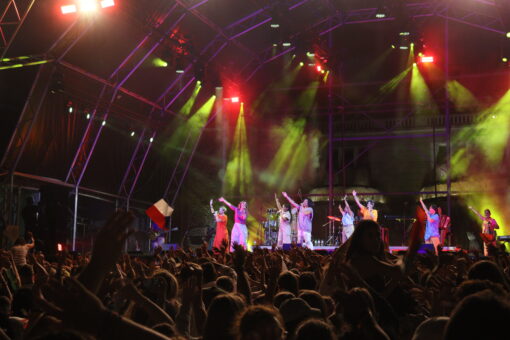
Aug 18, 2023 | Non categorizzato
From the end of July to the beginning of August 2023, Gen Verde travelled the length and breadth of Portugal. A fortnight long tour featuring art workshops and concerts. Many young people were involved in an experience of transforming music into a means of testimony and encounter. The journey, from 23rd July-4th August, started in Braga (north Portugal), continued south to the Algarve and concluded in Lisbon, in the festive and intoxicating atmosphere of a World Youth Day (WYD). This was the itinerary of the Gen Verde International Performing Arts Group, an all women band which began in 1966 from an inspiration of Chiara Lubich, founder of the Focolare Movement. 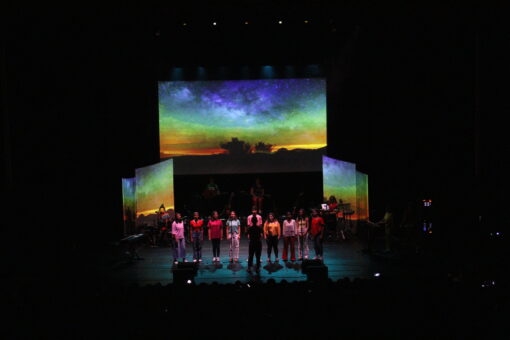 It was a demanding tour characterized by encounters and friendship. The seeds sown through words and notes yielded a rich harvest of real life experiences. One of Gen Verde’s projects is the “Start Now” workshop, a musical and artistic project which focuses on peace and dialogue education. One such workshop took place in Braga with an amazing group of young people from Spain and Portugal and included a special collaboration with Projeto Homem Braga (PHB). PHB specializes in the treatment, prevention, harm reduction and reintegration of people with addictions. After a meeting with Gen Verde, one of the PHB educators said, “We usually feel a bit anxious when we invite people from outside to get to know the users of our Centre because we don’t want to disturb their recovery process. Today we have to thank you for giving so much joy to all of us”. A Spanish boy who attended the workshop commented, “We have discovered that music, dance and art can really help us overcome many barriers, such as linguistic and cultural barriers. Sometimes it’s difficult to ‘row’ in the same direction, it takes patience because we don’t all go at the same pace, but one thing we carry with us is the joy that is transmitted, beyond the difficulties. Love makes us overcome all conflicts”. To the sound of “Girl On A Mission (Magnificat)”, the song composed by Gen Verde for the WYD, the Band moved to Faro (Algarve- Portugal) where they participated in the Dioceses’ pre-WYD preparation, concluding on 31st July, with a concert in the Algarve Stadium. Next stop was the Portuguese capital for another “Start Now” workshop with about 100 young people. At the end, on 2nd August, the young people performed with the Band in the jam-packed Auditório da Faculdade de Medicina Dentária. A Portuguese girl said, “It was very gratifying to take part in an activity like this because we can learn about and get to know others. We understood that it is important both to say our opinion and to know how to lose that idea in teamwork. The word that summarizes everything we have learned is humility, to give others the opportunity to express themselves”. Another girl spoke about learning to overcome challenges in the sense of “being able to listen, to understand others’ ideas, to learn how to interact, to let go of shyness and create something beautiful and do it together”. Marita Alvarez (Argentina), one of Gen Verde’s singers, told us: “Over the years, we have met many young people in our artistic workshops in many countries, from Slovakia, Poland, Ukraine, to Spain, Austria, Germany and Italy, to name a few. Deep, true and lasting relationships have been formed. We have seen how these young people become leaders of their communities, committed and ready to multiply joy through the “Magnificat anima mea” that God has brought about in their lives”.
It was a demanding tour characterized by encounters and friendship. The seeds sown through words and notes yielded a rich harvest of real life experiences. One of Gen Verde’s projects is the “Start Now” workshop, a musical and artistic project which focuses on peace and dialogue education. One such workshop took place in Braga with an amazing group of young people from Spain and Portugal and included a special collaboration with Projeto Homem Braga (PHB). PHB specializes in the treatment, prevention, harm reduction and reintegration of people with addictions. After a meeting with Gen Verde, one of the PHB educators said, “We usually feel a bit anxious when we invite people from outside to get to know the users of our Centre because we don’t want to disturb their recovery process. Today we have to thank you for giving so much joy to all of us”. A Spanish boy who attended the workshop commented, “We have discovered that music, dance and art can really help us overcome many barriers, such as linguistic and cultural barriers. Sometimes it’s difficult to ‘row’ in the same direction, it takes patience because we don’t all go at the same pace, but one thing we carry with us is the joy that is transmitted, beyond the difficulties. Love makes us overcome all conflicts”. To the sound of “Girl On A Mission (Magnificat)”, the song composed by Gen Verde for the WYD, the Band moved to Faro (Algarve- Portugal) where they participated in the Dioceses’ pre-WYD preparation, concluding on 31st July, with a concert in the Algarve Stadium. Next stop was the Portuguese capital for another “Start Now” workshop with about 100 young people. At the end, on 2nd August, the young people performed with the Band in the jam-packed Auditório da Faculdade de Medicina Dentária. A Portuguese girl said, “It was very gratifying to take part in an activity like this because we can learn about and get to know others. We understood that it is important both to say our opinion and to know how to lose that idea in teamwork. The word that summarizes everything we have learned is humility, to give others the opportunity to express themselves”. Another girl spoke about learning to overcome challenges in the sense of “being able to listen, to understand others’ ideas, to learn how to interact, to let go of shyness and create something beautiful and do it together”. Marita Alvarez (Argentina), one of Gen Verde’s singers, told us: “Over the years, we have met many young people in our artistic workshops in many countries, from Slovakia, Poland, Ukraine, to Spain, Austria, Germany and Italy, to name a few. Deep, true and lasting relationships have been formed. We have seen how these young people become leaders of their communities, committed and ready to multiply joy through the “Magnificat anima mea” that God has brought about in their lives”. 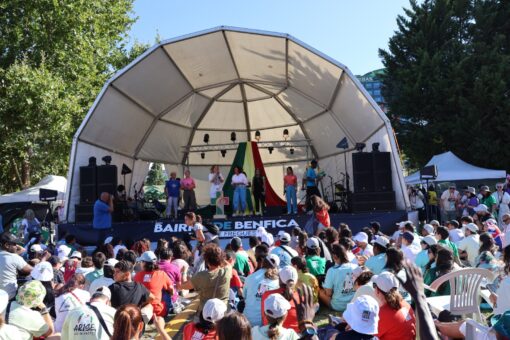 With the WYD, Lisbon gleamed with all the colours of youth. It was a unique opportunity to give witness and at the same time, experience the vivacity of a pilgrim Church which, from all parts of the globe, calls us by name. In this family spirit, Gen Verde took part in the second day of the “Rise Up” catechesis organized by the Focolare Movement. They sang and animated the Mass with over 7,000 young people. They then concluded their trip to Portugal on 4th August, with a concert in Alameda Dom Afonso Henriques, at the end of the Halleluya Festival.
With the WYD, Lisbon gleamed with all the colours of youth. It was a unique opportunity to give witness and at the same time, experience the vivacity of a pilgrim Church which, from all parts of the globe, calls us by name. In this family spirit, Gen Verde took part in the second day of the “Rise Up” catechesis organized by the Focolare Movement. They sang and animated the Mass with over 7,000 young people. They then concluded their trip to Portugal on 4th August, with a concert in Alameda Dom Afonso Henriques, at the end of the Halleluya Festival.  Jesús Morán, Co-President of the Focolare Movement was there and had this impression, “I was very struck by their unity. The young people were overjoyed. They were all taken by the rhythm and the music, but the songs include many deep moments and in those, the young people were able to pause and reflect. I thought it was like a ‘fifteenth station’ of the Via Crucis! There is no such thing and yet as everyone says and imagines, it is a sign of the Resurrection. It was a hymn to the Resurrection, to joy. I believe that this is the right way to communicate the Gospel with a musical language that young people love”.
Jesús Morán, Co-President of the Focolare Movement was there and had this impression, “I was very struck by their unity. The young people were overjoyed. They were all taken by the rhythm and the music, but the songs include many deep moments and in those, the young people were able to pause and reflect. I thought it was like a ‘fifteenth station’ of the Via Crucis! There is no such thing and yet as everyone says and imagines, it is a sign of the Resurrection. It was a hymn to the Resurrection, to joy. I believe that this is the right way to communicate the Gospel with a musical language that young people love”.
Maria Grazia Berretta
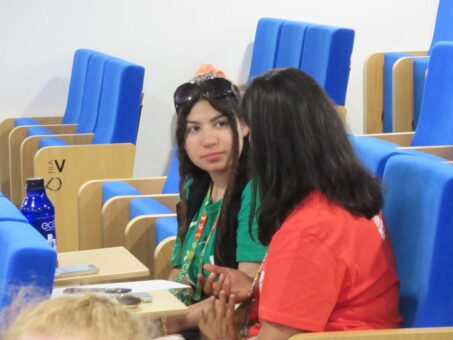
Aug 4, 2023 | Non categorizzato
During the World Youth Day 2023 in Portugal, DIALOP’s journey goes one step further. From 20 countries, 134 young peolpe participated in the workshop “Communication in times of war” promoted by DIALOP during the WYD to discuss how social media and digital technology may become traps of conspiracy and tendentious interests during conflicts. The journey Christianity and Socialism – two movements with very different characteristics – have been for long at loggerheads with each other, but have nevertheless both shaped world history in past centuries. It is based on the idea that the biggest challenges of the world today cannot be solved alone, DIALOP fosters dialogue of good willing persons, with secular and religious backgrounds, especially between Socialist/Marxists and Christians to create a transformative transversal ethic. Bringing DIALOP to the World Youth Day is part of the “DialogUE Project” which, in collaboration with the European Community involves 14 civil society organizations, explores and develops the often challenging dialogue between different groups, in order to shape a Europe that is ever more an expression of that “unity in multiplicity”. 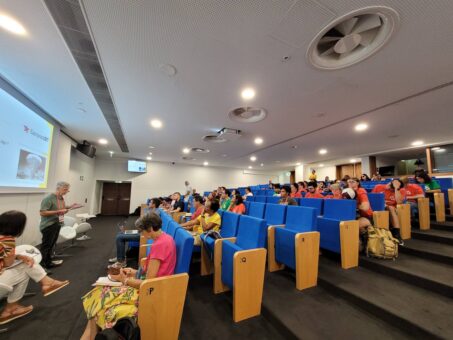 The preparation involving both Christian and Marxist-socialist experts started 6 months before the event, a committed and laborious path towards the WYD. The challenges were many, such as finding a dynamic way of mediating heavy content like conflict and communication, different languages, countries and backgrounds. “The emotion of standing before a generation that is hungry for a calming, reasoned, clear truth and hope and being able to give some of this”, Luisa Sello, one of the coordinators of the project shares her impressions. Youth in dialogue War and its destructive potential influence the structure of communication, transform the perception of facts, and instrumentalize language and mindsets. In such context, social media and digital technology may become traps of conspiracy and tendentious interests. Can we approach the truth? Can we react or are we convicted to destroy relationships with humans, countries, populations because of lies and misinformation? How can we keep making choices, build relationships, and stand with truth and justice? The workshop addressed all these challenges and engaged the youth to build on proposals for the European Union, which will be collected and presented to the EU within the European Commission funding project CERV (Citizens, Equality, Rights and Values Programme) in March 2024. After panels and dynamics discussions, the question “what can we do?” resonated among the youth. The desire of being part of a transformation as a changemaker is at the heart of each young person present.
The preparation involving both Christian and Marxist-socialist experts started 6 months before the event, a committed and laborious path towards the WYD. The challenges were many, such as finding a dynamic way of mediating heavy content like conflict and communication, different languages, countries and backgrounds. “The emotion of standing before a generation that is hungry for a calming, reasoned, clear truth and hope and being able to give some of this”, Luisa Sello, one of the coordinators of the project shares her impressions. Youth in dialogue War and its destructive potential influence the structure of communication, transform the perception of facts, and instrumentalize language and mindsets. In such context, social media and digital technology may become traps of conspiracy and tendentious interests. Can we approach the truth? Can we react or are we convicted to destroy relationships with humans, countries, populations because of lies and misinformation? How can we keep making choices, build relationships, and stand with truth and justice? The workshop addressed all these challenges and engaged the youth to build on proposals for the European Union, which will be collected and presented to the EU within the European Commission funding project CERV (Citizens, Equality, Rights and Values Programme) in March 2024. After panels and dynamics discussions, the question “what can we do?” resonated among the youth. The desire of being part of a transformation as a changemaker is at the heart of each young person present. 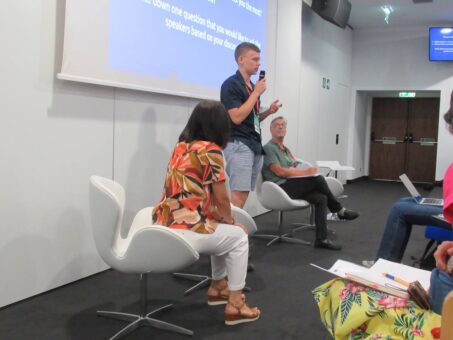 Steven, from the USA, wants to become a priest and travel overseas to help people shared his perplexities: “I can’t even tell my parents to stop reading sources of information that are problematic. When Jesus returned from Nazareth he was rejected by his family. So many of us have lost hope. Where do we get our hope back? That’s why we’re here at the WYD.” Adriana, a journalism student from Argentina felt encouraged by the workshop “Our role as the youth is very important to fight against disinformation and it can be done also in a fun way. If we create community we can be stronger.” Towards a transversal ethics The course of history depends not only on the strength of ideas but more heavily on the evolution of political and economic interests that integrate more than once only pale reflections of these ideas. The calling of Pope Francis in 2014 that inspired DIALOP to initiate a transversal dialogue continues to unfold.
Steven, from the USA, wants to become a priest and travel overseas to help people shared his perplexities: “I can’t even tell my parents to stop reading sources of information that are problematic. When Jesus returned from Nazareth he was rejected by his family. So many of us have lost hope. Where do we get our hope back? That’s why we’re here at the WYD.” Adriana, a journalism student from Argentina felt encouraged by the workshop “Our role as the youth is very important to fight against disinformation and it can be done also in a fun way. If we create community we can be stronger.” Towards a transversal ethics The course of history depends not only on the strength of ideas but more heavily on the evolution of political and economic interests that integrate more than once only pale reflections of these ideas. The calling of Pope Francis in 2014 that inspired DIALOP to initiate a transversal dialogue continues to unfold.  When asked by a young person how to create a common ethical framework when there is so much division, Walter Baier, the President of the Party of the European Left answered: “Pope Francis said that we have to accept conflict as something natural, what we need to know is what to do with the conflict. The fact that Christians and marxists coming from very different traditions, even with very different languages, can sit together and work on a common framework is an example of dialogue.” Angelina Giannopoulou, from transform!europe and José Manuel Pureza from Bloco de Esquerda also lectured besides Michele Zanzucchi and Ana Clara Giovani from Sophia University together with Maria Chiara de Lorenzo from the Focolare Movement. In the future, as part of DialogUE Project, DIALOP will hold other symposia on ecology and social policies. For more information, access https://dialop.eu
When asked by a young person how to create a common ethical framework when there is so much division, Walter Baier, the President of the Party of the European Left answered: “Pope Francis said that we have to accept conflict as something natural, what we need to know is what to do with the conflict. The fact that Christians and marxists coming from very different traditions, even with very different languages, can sit together and work on a common framework is an example of dialogue.” Angelina Giannopoulou, from transform!europe and José Manuel Pureza from Bloco de Esquerda also lectured besides Michele Zanzucchi and Ana Clara Giovani from Sophia University together with Maria Chiara de Lorenzo from the Focolare Movement. In the future, as part of DialogUE Project, DIALOP will hold other symposia on ecology and social policies. For more information, access https://dialop.eu
Ana Clara Giovani
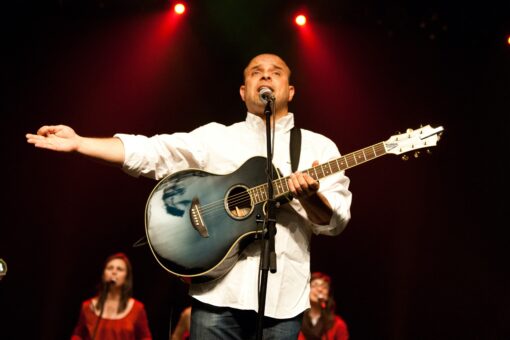
Jul 31, 2023 | Non categorizzato
A song for young people from all over the world to sing in unison. Father João Paulo Vaz, a priest from Coimbra (Portugal) wrote the lyrics of the WYD Lisbon 2023 anthem and the music was composed by Pedro Ferreira, a teacher and musician. Two young people from the Focolare Movement (Gen), Lourdes Catalán and Ivan Ho, interviewed him. World Youth Day (WYD) 2023 takes place very soon and in the streets of Lisbon (Portugal), the city hosting this global event, you can already hear the first young people to arrive singing “Há Pressa no Ar” (Feel the rush in the air), the official theme tune inspired by the words “Mary got up and went in haste” (Lk 1:39). Here we discover with Father João Paulo Vaz, a priest in the Coimbra diocese who wrote the lyrics, how the song came about. Lourdes: Father João Paulo, what does the WYD mean to you and why did you decide to enter the competition to select a theme tune for Lisbon 2023? 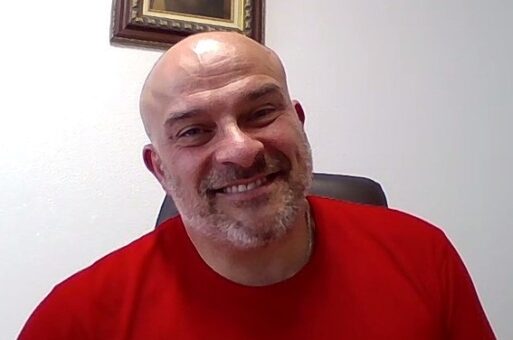 Father João Paulo Vaz: I have participated in no less than six WYDs in my life (Paris, Rome, Toronto, Cologne, Sydney and Madrid), some of them as head of youth pastoral work in the diocese. Each of them has marked my journey as a man, a Christian and a priest. They have been very intense experiences of faith and communion, and some things in particular really left their mark. One of them has always been the theme tune. When I heard we could participate in the competition for the Lisbon 2023 theme tune, I was very happy, both because of my personal experience and as a composer. I had decided to submit the lyrics but, at a certain point, I realised I had forgotten to register in time because you had to declare your intention to participate before submitting the song. When I realised this I was very sad, but God never leaves me alone. A group of participants who HAD signed up on time and only had a musical score ready asked me anyway if they could use my words and that’s how I entered the competition. Shortly afterwards, I learned with great joy that my song had been chosen. I was overjoyed because I really felt it was God’s answer to my wish. Ivan: What message did you want to convey through the song? Father João Paulo Vaz: First of all, the message I thought of addressing to each young person is “Christ is always with you, He never abandons you and with Him you will be able to love much more”. That is why, with Him, “my voice rises higher and everyone will hear it”, as the song explains, because you are no longer afraid. The whole text takes this direction and Mary, the main protagonist of this WYD, in the simplicity and humility of her figure, represents all these things: She whose voice rises first because she brings Christ with her; the first evangeliser who, with her ‘yes’ and on her way to Elizabeth, also shows us how to bring Him to others. Ivan: So many young people from all over the world are expected in Lisbon. How does it feel to think that they will all sing this song together? Father João Paulo Vaz: It’s really important to say that as soon as the song was chosen as the WYD anthem, it no longer belonged to us, it was no longer ours. It was no longer my words or Pedro Ferreira’s music. It is the theme song of WYD Lisbon 2023. I will sing it with the others: this will be the greatest joy. Lourdes: If you could sum up the theme tune in one or two words, what would they be?
Father João Paulo Vaz: I have participated in no less than six WYDs in my life (Paris, Rome, Toronto, Cologne, Sydney and Madrid), some of them as head of youth pastoral work in the diocese. Each of them has marked my journey as a man, a Christian and a priest. They have been very intense experiences of faith and communion, and some things in particular really left their mark. One of them has always been the theme tune. When I heard we could participate in the competition for the Lisbon 2023 theme tune, I was very happy, both because of my personal experience and as a composer. I had decided to submit the lyrics but, at a certain point, I realised I had forgotten to register in time because you had to declare your intention to participate before submitting the song. When I realised this I was very sad, but God never leaves me alone. A group of participants who HAD signed up on time and only had a musical score ready asked me anyway if they could use my words and that’s how I entered the competition. Shortly afterwards, I learned with great joy that my song had been chosen. I was overjoyed because I really felt it was God’s answer to my wish. Ivan: What message did you want to convey through the song? Father João Paulo Vaz: First of all, the message I thought of addressing to each young person is “Christ is always with you, He never abandons you and with Him you will be able to love much more”. That is why, with Him, “my voice rises higher and everyone will hear it”, as the song explains, because you are no longer afraid. The whole text takes this direction and Mary, the main protagonist of this WYD, in the simplicity and humility of her figure, represents all these things: She whose voice rises first because she brings Christ with her; the first evangeliser who, with her ‘yes’ and on her way to Elizabeth, also shows us how to bring Him to others. Ivan: So many young people from all over the world are expected in Lisbon. How does it feel to think that they will all sing this song together? Father João Paulo Vaz: It’s really important to say that as soon as the song was chosen as the WYD anthem, it no longer belonged to us, it was no longer ours. It was no longer my words or Pedro Ferreira’s music. It is the theme song of WYD Lisbon 2023. I will sing it with the others: this will be the greatest joy. Lourdes: If you could sum up the theme tune in one or two words, what would they be?  Father João Paulo Vaz: The first is “depth”, which means discovering who we are, discovering Christ in us and living from that discovery; the second is “courage”, to be the presence of God in the world, to announce life. It is in these two words, in my opinion, that the experience of faith flourishes. Ivan: What is your personal message for the young people of today? Father João Paulo Vaz: I would like to use the words of Pope Francis, spoken in one of the promotional videos for the WYD, in which he invites us to go ahead without fear, to build a better world and to be protagonists. We really need our young people to value the world more, to return to true values. We need to do away with fear and be aware that young people are the ones who will build a better future. So, dear young person, you can’t sit still and watch the world from your armchair. You need to get up and go, like Mary. The WYD, and this one in particular, is an opportunity to say that you believe and that you are willing to do what God asks of you; more than anything else, it is telling you that you are not alone in this. A whole world of young people and the Pope are ready to walk with you.
Father João Paulo Vaz: The first is “depth”, which means discovering who we are, discovering Christ in us and living from that discovery; the second is “courage”, to be the presence of God in the world, to announce life. It is in these two words, in my opinion, that the experience of faith flourishes. Ivan: What is your personal message for the young people of today? Father João Paulo Vaz: I would like to use the words of Pope Francis, spoken in one of the promotional videos for the WYD, in which he invites us to go ahead without fear, to build a better world and to be protagonists. We really need our young people to value the world more, to return to true values. We need to do away with fear and be aware that young people are the ones who will build a better future. So, dear young person, you can’t sit still and watch the world from your armchair. You need to get up and go, like Mary. The WYD, and this one in particular, is an opportunity to say that you believe and that you are willing to do what God asks of you; more than anything else, it is telling you that you are not alone in this. A whole world of young people and the Pope are ready to walk with you.
Lourdes Catalán e Ivan Ho

 Herbert Lauenroth, historian and member of IpE’s Steering Committee, emphasized the crisis affecting all Churches and highlighted the weight of the moment: “Where is Europe today, Together for Europe? What kind of Europe, what kind of ‘Togetherness’ are we moving toward?” Against a backdrop of growing uncertainty, participants discussed what “Together for Europe” means, trying to discern the direction and future prospects. From the first sessions, it was evident that the choice of Timisoara as the venue for the meeting added an extra layer of significance. The European Capital of Culture 2023 is a testimony to the harmonious coexistence of different christian denominations, where diverse communities meet and thrive in unity. Gerhard Proß, IpE moderator and head of the CVJM (Christlicher Verein junger Menschen) in Esslingen, Germany, offered a perspective from the christian faith: “God creates space in the cracks,” he said, “Jesus himself entered the deepest of cracks in this world.” He went on to explain that the image of Christ, with his arms outstretched between heaven and earth, symbolizes a deep entrance into the cracks between God and humanity, between individuals, groups, denominations and nations. Jesus went down into the deepest: “There he created a space of life.” Words that resonated deeply, provoking reflections on how, in the face of contemporary challenges, Christian communities can create spaces of life in the midst of division, tension and uncertainty. Cultivating unity
Herbert Lauenroth, historian and member of IpE’s Steering Committee, emphasized the crisis affecting all Churches and highlighted the weight of the moment: “Where is Europe today, Together for Europe? What kind of Europe, what kind of ‘Togetherness’ are we moving toward?” Against a backdrop of growing uncertainty, participants discussed what “Together for Europe” means, trying to discern the direction and future prospects. From the first sessions, it was evident that the choice of Timisoara as the venue for the meeting added an extra layer of significance. The European Capital of Culture 2023 is a testimony to the harmonious coexistence of different christian denominations, where diverse communities meet and thrive in unity. Gerhard Proß, IpE moderator and head of the CVJM (Christlicher Verein junger Menschen) in Esslingen, Germany, offered a perspective from the christian faith: “God creates space in the cracks,” he said, “Jesus himself entered the deepest of cracks in this world.” He went on to explain that the image of Christ, with his arms outstretched between heaven and earth, symbolizes a deep entrance into the cracks between God and humanity, between individuals, groups, denominations and nations. Jesus went down into the deepest: “There he created a space of life.” Words that resonated deeply, provoking reflections on how, in the face of contemporary challenges, Christian communities can create spaces of life in the midst of division, tension and uncertainty. Cultivating unity  The attendees participated in dialogue sessions, engaged together in intellectual discourse, experiential workshops and prayer times. Six workshops explored topics such as social integration, youth perspectives, ethics and non-violence, promoting a deeper understanding of diversity within the Christian community. One highlight was a visit to the Orthodox Cathedral Museum, followed by Vespers in the city’s Orthodox Cathedral, attended by dignitaries and religious leaders from the different churches present. These
The attendees participated in dialogue sessions, engaged together in intellectual discourse, experiential workshops and prayer times. Six workshops explored topics such as social integration, youth perspectives, ethics and non-violence, promoting a deeper understanding of diversity within the Christian community. One highlight was a visit to the Orthodox Cathedral Museum, followed by Vespers in the city’s Orthodox Cathedral, attended by dignitaries and religious leaders from the different churches present. These  moments of common prayer fostered a harmonious atmosphere in which unity and diversity coexisted. Plenary talks and activities were punctuated by music and prayer, creating a thread throughout the conference. During one of their songs, the Ecumenical Youth Choir invited everyone to embrace different ways of praying, “We know that we all pray in our own way. Let us open ourselves to experience each other’s prayer during these days in Timisoara.” Particularly powerful was the moment of prayer for peace in which conflicts around the world were named, with a focus on Ukraine and the Middle East. All participants pledged their commitment to unity, making a pact of mutual love. A moment that was meant to symbolize the cornerstone on which a fraternal Europe is founded. Linking values to policies
moments of common prayer fostered a harmonious atmosphere in which unity and diversity coexisted. Plenary talks and activities were punctuated by music and prayer, creating a thread throughout the conference. During one of their songs, the Ecumenical Youth Choir invited everyone to embrace different ways of praying, “We know that we all pray in our own way. Let us open ourselves to experience each other’s prayer during these days in Timisoara.” Particularly powerful was the moment of prayer for peace in which conflicts around the world were named, with a focus on Ukraine and the Middle East. All participants pledged their commitment to unity, making a pact of mutual love. A moment that was meant to symbolize the cornerstone on which a fraternal Europe is founded. Linking values to policies  As part of the EU-funded DialogUE project, the annual “Together for Europe” meeting also addressed issues aimed at developing advice and recommendations for EU social policies. Professor Philip McDonagh, a former Irish diplomat and director of Dublin University’s “Center for Religion, Human Values and International Relations,” stressed the importance of Article 17 of the Treaty on the Functioning of the European Union (TFEU). This article promotes open and transparent dialogue on major social issues facing Europe through high-level meetings and seminars for dialogue and work between european institutions and Churches, as well as non-denominational and philosophical organizations. The professor emphasized the contribution of Churches in public debate, drawing on their philosophical foundations, values of compassion, care, solidarity, and respect for pluralism. He hoped that Churches would work to bridge the gap between high-level values and everyday policies, offering a much-needed perspective on issues such as peace, inclusion, and integration. Calling for a multilateral approach, he stressed the need for Europe to be perceived positively by the global community and highlighted the responsibility to consider the perspectives of the Global South. Hope in unity
As part of the EU-funded DialogUE project, the annual “Together for Europe” meeting also addressed issues aimed at developing advice and recommendations for EU social policies. Professor Philip McDonagh, a former Irish diplomat and director of Dublin University’s “Center for Religion, Human Values and International Relations,” stressed the importance of Article 17 of the Treaty on the Functioning of the European Union (TFEU). This article promotes open and transparent dialogue on major social issues facing Europe through high-level meetings and seminars for dialogue and work between european institutions and Churches, as well as non-denominational and philosophical organizations. The professor emphasized the contribution of Churches in public debate, drawing on their philosophical foundations, values of compassion, care, solidarity, and respect for pluralism. He hoped that Churches would work to bridge the gap between high-level values and everyday policies, offering a much-needed perspective on issues such as peace, inclusion, and integration. Calling for a multilateral approach, he stressed the need for Europe to be perceived positively by the global community and highlighted the responsibility to consider the perspectives of the Global South. Hope in unity  Margaret Karram, president of the Focolare Movement, was present along with Co-President Jesús Morán and spoke, offering words of hope: “I would like to have with all of you this conviction: everything is possible!” Her words encouraged an optimistic outlook, the recognition of shared humanity, and the creation of networks of fraternity. Karram encouraged the Together for Europe network to embrace Gospel-born charisms, engage in dialogue and open spaces to pursue tangible responses to contemporary challenges. Bishop Josef-Csaba Pál of Timisoara expressed gratitude for these days: “A small seed of this fraternity, unity, and love has been sown in us, in our Churches, but also in society. The Together for Europe network is one of those wonderful initiatives where God has allowed good things to grow over the years. Let us continue to work together with all people of good will!” Looking ahead, it was announced that the next annual meeting of Together for Europe will be held in Graz-Seckau, Austria, from October 31 to November 2, 2024. Christian denominations present: Greek Orthodox, Romanian, Armenian and Russian Orthodox, Greek, Roman and Old Catholic, Protestant, Lutheran, Reformed, Anglican and Free Churches.
Margaret Karram, president of the Focolare Movement, was present along with Co-President Jesús Morán and spoke, offering words of hope: “I would like to have with all of you this conviction: everything is possible!” Her words encouraged an optimistic outlook, the recognition of shared humanity, and the creation of networks of fraternity. Karram encouraged the Together for Europe network to embrace Gospel-born charisms, engage in dialogue and open spaces to pursue tangible responses to contemporary challenges. Bishop Josef-Csaba Pál of Timisoara expressed gratitude for these days: “A small seed of this fraternity, unity, and love has been sown in us, in our Churches, but also in society. The Together for Europe network is one of those wonderful initiatives where God has allowed good things to grow over the years. Let us continue to work together with all people of good will!” Looking ahead, it was announced that the next annual meeting of Together for Europe will be held in Graz-Seckau, Austria, from October 31 to November 2, 2024. Christian denominations present: Greek Orthodox, Romanian, Armenian and Russian Orthodox, Greek, Roman and Old Catholic, Protestant, Lutheran, Reformed, Anglican and Free Churches. 

 It was a demanding tour characterized by encounters and friendship. The seeds sown through words and notes yielded a rich harvest of real life experiences. One of Gen Verde’s projects is the
It was a demanding tour characterized by encounters and friendship. The seeds sown through words and notes yielded a rich harvest of real life experiences. One of Gen Verde’s projects is the  With the WYD, Lisbon gleamed with all the colours of youth. It was a unique opportunity to give witness and at the same time, experience the vivacity of a pilgrim Church which, from all parts of the globe, calls us by name. In this family spirit, Gen Verde took part in the second day of the “Rise Up” catechesis organized by the Focolare Movement. They sang and animated the Mass with over 7,000 young people. They then concluded their trip to Portugal on 4th August, with a concert in Alameda Dom Afonso Henriques, at the end of the Halleluya Festival.
With the WYD, Lisbon gleamed with all the colours of youth. It was a unique opportunity to give witness and at the same time, experience the vivacity of a pilgrim Church which, from all parts of the globe, calls us by name. In this family spirit, Gen Verde took part in the second day of the “Rise Up” catechesis organized by the Focolare Movement. They sang and animated the Mass with over 7,000 young people. They then concluded their trip to Portugal on 4th August, with a concert in Alameda Dom Afonso Henriques, at the end of the Halleluya Festival. 
 The preparation involving both Christian and Marxist-socialist experts started 6 months before the event, a committed and laborious path towards the WYD. The challenges were many, such as finding a dynamic way of mediating heavy content like conflict and communication, different languages, countries and backgrounds. “The emotion of standing before a generation that is hungry for a calming, reasoned, clear truth and hope and being able to give some of this”, Luisa Sello, one of the coordinators of the project shares her impressions. Youth in dialogue War and its destructive potential influence the structure of communication, transform the perception of facts, and instrumentalize language and mindsets. In such context, social media and digital technology may become traps of conspiracy and tendentious interests. Can we approach the truth? Can we react or are we convicted to destroy relationships with humans, countries, populations because of lies and misinformation? How can we keep making choices, build relationships, and stand with truth and justice? The workshop addressed all these challenges and engaged the youth to build on proposals for the European Union, which will be collected and presented to the EU within the European Commission funding project CERV (Citizens, Equality, Rights and Values Programme) in March 2024. After panels and dynamics discussions, the question “what can we do?” resonated among the youth. The desire of being part of a transformation as a changemaker is at the heart of each young person present.
The preparation involving both Christian and Marxist-socialist experts started 6 months before the event, a committed and laborious path towards the WYD. The challenges were many, such as finding a dynamic way of mediating heavy content like conflict and communication, different languages, countries and backgrounds. “The emotion of standing before a generation that is hungry for a calming, reasoned, clear truth and hope and being able to give some of this”, Luisa Sello, one of the coordinators of the project shares her impressions. Youth in dialogue War and its destructive potential influence the structure of communication, transform the perception of facts, and instrumentalize language and mindsets. In such context, social media and digital technology may become traps of conspiracy and tendentious interests. Can we approach the truth? Can we react or are we convicted to destroy relationships with humans, countries, populations because of lies and misinformation? How can we keep making choices, build relationships, and stand with truth and justice? The workshop addressed all these challenges and engaged the youth to build on proposals for the European Union, which will be collected and presented to the EU within the European Commission funding project CERV (Citizens, Equality, Rights and Values Programme) in March 2024. After panels and dynamics discussions, the question “what can we do?” resonated among the youth. The desire of being part of a transformation as a changemaker is at the heart of each young person present.  Steven, from the USA, wants to become a priest and travel overseas to help people shared his perplexities: “I can’t even tell my parents to stop reading sources of information that are problematic. When Jesus returned from Nazareth he was rejected by his family. So many of us have lost hope. Where do we get our hope back? That’s why we’re here at the WYD.” Adriana, a journalism student from Argentina felt encouraged by the workshop “Our role as the youth is very important to fight against disinformation and it can be done also in a fun way. If we create community we can be stronger.” Towards a transversal ethics The course of history depends not only on the strength of ideas but more heavily on the evolution of political and economic interests that integrate more than once only pale reflections of these ideas. The calling of Pope Francis in 2014 that inspired DIALOP to initiate a transversal dialogue continues to unfold.
Steven, from the USA, wants to become a priest and travel overseas to help people shared his perplexities: “I can’t even tell my parents to stop reading sources of information that are problematic. When Jesus returned from Nazareth he was rejected by his family. So many of us have lost hope. Where do we get our hope back? That’s why we’re here at the WYD.” Adriana, a journalism student from Argentina felt encouraged by the workshop “Our role as the youth is very important to fight against disinformation and it can be done also in a fun way. If we create community we can be stronger.” Towards a transversal ethics The course of history depends not only on the strength of ideas but more heavily on the evolution of political and economic interests that integrate more than once only pale reflections of these ideas. The calling of Pope Francis in 2014 that inspired DIALOP to initiate a transversal dialogue continues to unfold. 
 Father João Paulo Vaz: I have participated in no less than six WYDs in my life (Paris, Rome, Toronto, Cologne, Sydney and Madrid), some of them as head of youth pastoral work in the diocese. Each of them has marked my journey as a man, a Christian and a priest. They have been very intense experiences of faith and communion, and some things in particular really left their mark. One of them has always been the theme tune. When I heard we could participate in the competition for the Lisbon 2023 theme tune, I was very happy, both because of my personal experience and as a composer. I had decided to submit the lyrics but, at a certain point, I realised I had forgotten to register in time because you had to declare your intention to participate before submitting the song. When I realised this I was very sad, but God never leaves me alone. A group of participants who HAD signed up on time and only had a musical score ready asked me anyway if they could use my words and that’s how I entered the competition. Shortly afterwards, I learned with great joy that my song had been chosen. I was overjoyed because I really felt it was God’s answer to my wish. Ivan: What message did you want to convey through the song? Father João Paulo Vaz: First of all, the message I thought of addressing to each young person is “Christ is always with you, He never abandons you and with Him you will be able to love much more”. That is why, with Him, “my voice rises higher and everyone will hear it”, as the song explains, because you are no longer afraid. The whole text takes this direction and Mary, the main protagonist of this WYD, in the simplicity and humility of her figure, represents all these things: She whose voice rises first because she brings Christ with her; the first evangeliser who, with her ‘yes’ and on her way to Elizabeth, also shows us how to bring Him to others. Ivan: So many young people from all over the world are expected in Lisbon. How does it feel to think that they will all sing this song together? Father João Paulo Vaz: It’s really important to say that as soon as the song was chosen as the WYD anthem, it no longer belonged to us, it was no longer ours. It was no longer my words or Pedro Ferreira’s music. It is the theme song of WYD Lisbon 2023. I will sing it with the others: this will be the greatest joy. Lourdes: If you could sum up the theme tune in one or two words, what would they be?
Father João Paulo Vaz: I have participated in no less than six WYDs in my life (Paris, Rome, Toronto, Cologne, Sydney and Madrid), some of them as head of youth pastoral work in the diocese. Each of them has marked my journey as a man, a Christian and a priest. They have been very intense experiences of faith and communion, and some things in particular really left their mark. One of them has always been the theme tune. When I heard we could participate in the competition for the Lisbon 2023 theme tune, I was very happy, both because of my personal experience and as a composer. I had decided to submit the lyrics but, at a certain point, I realised I had forgotten to register in time because you had to declare your intention to participate before submitting the song. When I realised this I was very sad, but God never leaves me alone. A group of participants who HAD signed up on time and only had a musical score ready asked me anyway if they could use my words and that’s how I entered the competition. Shortly afterwards, I learned with great joy that my song had been chosen. I was overjoyed because I really felt it was God’s answer to my wish. Ivan: What message did you want to convey through the song? Father João Paulo Vaz: First of all, the message I thought of addressing to each young person is “Christ is always with you, He never abandons you and with Him you will be able to love much more”. That is why, with Him, “my voice rises higher and everyone will hear it”, as the song explains, because you are no longer afraid. The whole text takes this direction and Mary, the main protagonist of this WYD, in the simplicity and humility of her figure, represents all these things: She whose voice rises first because she brings Christ with her; the first evangeliser who, with her ‘yes’ and on her way to Elizabeth, also shows us how to bring Him to others. Ivan: So many young people from all over the world are expected in Lisbon. How does it feel to think that they will all sing this song together? Father João Paulo Vaz: It’s really important to say that as soon as the song was chosen as the WYD anthem, it no longer belonged to us, it was no longer ours. It was no longer my words or Pedro Ferreira’s music. It is the theme song of WYD Lisbon 2023. I will sing it with the others: this will be the greatest joy. Lourdes: If you could sum up the theme tune in one or two words, what would they be?